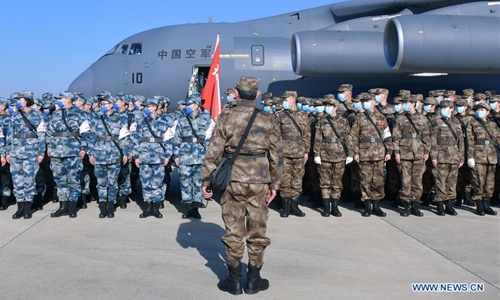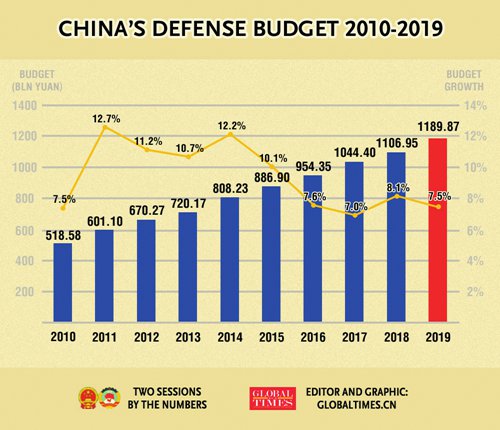COVID-19 may hit military budget, only mildly
Expenditures support technology development, contribute to China's economy: analysts

Military medics format after they deplaned a transport aircraft of the People's Liberation Army (PLA) Air Force at Tianhe International Airport in Wuhan, central China's Hubei Province, Feb. 17, 2020. (Xinhua/Li He)
China's military budget for 2020 could maintain a steady increase even though foreign reports have suggested that an economic crisis caused by the COVID-19 pandemic will hit military spending, but a slight decrease is also possible, Chinese analysts said on Tuesday.
The budget figure is expected to be announced at China's annual two sessions, which have been delayed due to the epidemic but are edging near as the situation is being brought under control. The defense budget may grow more slowly than in 2019, rising to about 1.27 trillion yuan ($179 billion), or it may fall to only 1 trillion yuan, analysts predicted from different perspectives.
China's defense budget for 2019 was 1.1899 trillion yuan, up 7.5 percent from 2018, according to information made public at the second session of the 13th National People's Congress in March 2019. China has maintained single-digit growth in its annual defense budget since 2016.
According to a report released by the Stockholm International Peace Research Institute (SIPRI) on Monday, global military spending grew at the fastest pace in a decade in 2019, but "data from previous global economic downturns suggests that the economic crisis resulting from the [COVID-19] pandemic will probably disrupt future spending.
Song Zhongping, a Chinese military expert and TV commentator, told the Global Times on Tuesday that China's military budget will maintain a moderate increase, and a growth rate slightly lower than last year's will be acceptable given the impact that COVID-19 has had on the economy.
One reason behind a possible continued increase in 2020 is China's goal to build world-class armed forces, and 2020 is scheduled to be a milestone, analysts said.
Mechanization of the Chinese armed forces should be basically achieved this year, with IT application coming a long way and strategic capabilities seeing a big improvement.
The modernization of the national defense and armed forces should be basically completed by 2035. The armed forces will transform into world-class military by the mid-21st century, according to a report to the 19th National Congress of the Communist Party of China in 2017.
Song said China is facing military pressure from countries and regions like the US, which makes an increased military budget necessary.
The SIPRI report showed the US drove global military expenditure growth, spending a whopping $732 billion in 2019. By comparison, No.2 China only spent $261 billion. The number for China in the report is higher than China's official figure.

China's defense budget 2010-2019
The US has been sending warships and flying reconnaissance aircraft in the South China Sea and East China Sea and crossing the Taiwan Straits more frequently than before the pandemic, military observers noted.
Also, the Chinese military has proven its effectiveness in fighting COVID-19, and there is still room for improvement, so epidemic prevention and control efforts also require military funding, Song said.
Since the outbreak of the COVID-19, the Chinese military has dispatched more than 4,000 medical personnel from multiple military medical units to aid Wuhan in Central China's Hubei Province, the city hit hardest by the epidemic in China. The effort started on January 24 via strategic transport, including military cargo planes.
http://www.globaltimes.cn/content/1185830.shtml
Three hospitals under military management in Wuhan deployed 2,856 beds and treated 7,198 confirmed COVID-19 patients without a single medical staff member getting infected, the Xinhua News Agency reported on April 16.
Boosting the military's capability in operations other than combat can actually help China overcome the economic impact of disasters like the epidemic, so an increased military budget will be worth it, Song said.
Another reason to expand the defense budget is that increasing investment in military research and development is boosting domestic demand at a time when exports are being hit by the pandemic, Song said. This development will bring momentum to the economy and enhance China's technological level, which will in turn boost the economy further.
Xu Guangyu, a senior consultant at the China Arms Control and Disarmament Association, raised another possibility.
In the past 30 years, China's military spending/GDP ratio has always remained within 2 percent, according to the national defense white paper issued by the State Council Information Office in July 2019.
This is unlikely to change in 2020, Xu told the Global Times on Tuesday.
If GDP contracts, the defense budget will likely follow, and the military budget this year might not reach 1 trillion yuan, Xu predicted, noting that this trend is normal and other countries will also experience this impact.
However, even if the defense budget shrinks a bit this year, China's long-term military development plan won't be affected, because military spending is an ongoing process that generates returns across many years, and a slight one-year decrease won't have a major impact, Xu said.
China allocates defense spending mainly on salaries and benefits for personnel, training, facilities and consumables expenditure, as well as weaponry and equipment development, the 2019 white paper said.
"China takes into consideration the development of the economy and the demands of national defense, and then decides on the appropriate scale and composition of defense expenditure," the white paper reads.
Newspaper headline: Military budget largely immune to pandemic